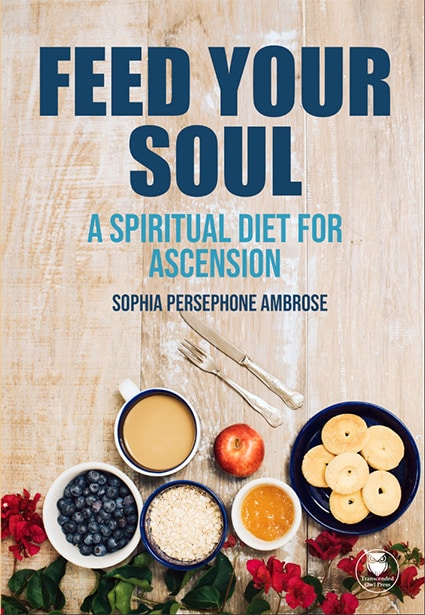
OUT NOW
Sophia’s new book Feed Your Soul: A Spiritual Diet For Ascension teaches you how to align your diet to your spiritual journey and includes healthy, simple, spiritually aligned recipes.
Start Eating For Ascension Today
In this post I reveal the best foods to eat during spiritual awakening and explain how to adopt a spiritual diet. What you put in your body has a huge effect on your ability to connect with your higher self and move forward in your awakening. Read on to discover what to eat to optimize your spiritual progress.
The Three Goals of a Spiritual Diet
A spiritual diet aims to achieve three main goals:
#1 To Nourish the Body
We are a collaboration of mind, body, and spirit: all three need to be nurtured and nourished for optimal performance.
Eating a spiritual diet ensures your body becomes a strong vehicle for your journey.
#2 To Faciliate Connection
Certain foods can help you connect to the universe and your higher self.
Foods that contain tryptophan, for example, stimulate serotonin production, aiding your spiritual connection.
Conversely, there are foods which severely restrict your ability to elevate your consciousness.
These should be eliminated from a spiritual diet, as I explain later in this post.
#3 To Reduce Harm
By choosing foods which reduce the harm you inflict on the environment and other beings, you build positive karma.
This makes it easier for your spiritual team to assist you and also raises the overall vibration of the planet.
Do You Have to be Vegan to be Spiritual?
No, you don’t have to be vegan to be spiritual, or even vegetarian.
These types of diet don’t work for everyone and the most important thing during spiritual awakening is to be in optimal physical health.
If you’re already vegan or vegetarian and it works for you, great, stick with it.
But you don’t need to completely eliminate animal products from your diet to be spiritual.
While it’s desirable to reduce our harm, in today’s society it’s very difficult to avoid animal products all together.
However, there’re already plenty of alternatives coming down the track, such as lab-grown meat, which will make it far easier.
In fact, in the Earth’s future, there will come a time when we can eat a rounded diet without inflicting harm on other beings or the environment.
This is in the “cosmic plan.”
‘Models’ of Spiritual Diets
When considering a spiritual diet, there are several options you can ‘model’ from.
Each has its own benefits and can be adapted to fit your lifestyle and preferences.
And of course, it’s perfectly fine to build your own spiritual diet plan too, using the principles I share in this post.
#1 The Flexitarian Diet
A flexitarian diet is primarily plant-based but allows for occasional meat, fish, and other animal products.
This diet focuses on eating whole, unprocessed foods and emphasizes quality over quantity.
It’s a flexible approach that balances plant-based eating with ethical animal product consumption.
In many ways, it’s similar to the traditional Mediterranean diet and anti-inflammatory diet (see below).
Benefits of a Flexitarian Diet
A flexitarian diet offers numerous benefits, making it an excellent choice for those on a spiritual awakening journey:
- Reduces Harm: By primarily focusing on plant-based foods, you reduce harm to animals and the environment, which helps you build positive karma
- Nutrient-Rich: This diet is rich in vitamins, minerals, and antioxidants, providing your body with the nutrients it needs to function optimally
- Flexible: The flexibility of this diet makes it easier to stick to, as it doesn’t require you to eliminate entire food groups
- Sustainable: It promotes sustainable eating practices by emphasizing organic and locally-sourced foods
You can find a Flexitarian Diet meal plan here.
#2 The Mediterranean Diet
The Mediterranean diet is inspired by the traditional eating habits of people living in countries bordering the Mediterranean Sea, such as Greece, Italy, and Spain.
This diet emphasizes whole, unprocessed foods, healthy fats, and a high intake of fruits, vegetables, legumes, and whole grains.
It also includes moderate consumption of fish, poultry, dairy, and wine, with limited intake of red meat and sweets.
It’s a naturally spiritual diet which eliminates most of the ingredients which prevent the consciousness from elevating.
Benefits of the Mediterranean Diet
- Heart Health: Healthy fats from olive oil, nuts, and fish support your heart
- Anti-Inflammatory: Reduces inflammation with plenty of fruits, vegetables, and whole grains
- Brain Health: Omega-3s and antioxidants boost brain function
- Blood Sugar Balance: Whole grains and legumes help maintain stable blood sugar
- Weight Management: Nutrient-dense foods help you feel full and satisfied
- Gut Health: High fiber supports a healthy gut
- Mood Improvement: Nutrient-rich foods can boost mood and reduce anxiety
- Longevity: Linked to longer life and lower risk of chronic diseases
- Sustainable: Focuses on ethical and locally-sourced food choices
- Delicious: Known for its tasty and enjoyable recipes
You can find a Mediterranean Diet meal plan here.
#3 The Anti-Inflammatory Diet
The anti-inflammatory diet emphasizes foods that reduce inflammation in the body, thereby supporting overall health and well-being.
This diet includes a variety of fruits, vegetables, whole grains, healthy fats, and lean proteins and avoids processed foods, sugars, and unhealthy fats.
Benefits of the Anti-Inflammatory Diet
- Lowers Inflammation: Helps prevent diseases like heart disease and arthritis
- Supports Joint Health: Reduces joint pain and stiffness
- Boosts Immunity: Enhances the body’s immune response
- Promotes Heart Health: Maintains cardiovascular health
- Aids Digestion: High in fiber, promoting a healthy digestive system
- Stabilizes Blood Sugar: Reduces the risk of type 2 diabetes
- Supports Brain Function: Supports cognitive health and reduces the risk of cognitive decline
- Enhances Mood: Improves mood and reduces depression and anxiety
- Manages Weight: Helps manage weight with nutrient-dense, low-calorie foods
- Ethical and Sustainable: Promotes sustainability and ethical eating practices
You can find an Anti-Inflammatory Diet meal plan here.
Spiritual Diet: Which Foods to Eat During Spiritual Awakening
Eat as much of these foods as you want:
- Organic vegetables, especially green leafy vegetables
- Organic fruits
- Nuts and seeds
- Free-range, organic eggs
- A wide range of herbs and spices
- Pulses and beans
- Fermented foods, like kimchi
- Gluten-free whole grains, especially ancient grains, like amaranth, quinoa, and millet
- Cold-pressed, extra virgin olive oil
- Legumes
- Sea vegetables
- Healthy fats, like avocados and nut butters
Eat these foods in moderation:
- Full-fat, high-quality non-cow dairy
- High-quality honey, such as manuka honey
- Sustainable, line-caught fish, especially oily fish
- Shellfish and prawns
- Organic, ethically-reared poultry, including the skin
- Very dark chocolate with no added sugar
- Dried fruits
- Plant-based milks, like unsweetened almond milk, coconut milk, and oat milk
Eat as a very occasional treat or avoid altogether:
- Organic, grass-fed, ethically reared red meat
- Full-fat, high-quality cow dairy
- Whole wheat pasta and bread
Feeling Lost, Confused, Overwhelmed? Awakening Can Be Tough, But You Don’t Have to Do it Alone.
My New Online Course – A Complete Guide to Spiritual Awakening – Provides Expert Guidance, Clear Answers, and Essential Tools, to Help You on Your Path.
Spiritual Diet: Which Foods to Avoid During Spiritual Awakening
To support your spiritual awakening journey, it’s also important to avoid certain foods:
- Sugar and Refined Carbs: Anchor us in the physical body and cause inflammation
- Processed Foods: Harmful to our bodies and the environment
- Diet Foods: Often full of sugar and heavily processed
- High Gluten Especially Modern Wheat: Can cause inflammation and disrupt gut balance
- Deep-Fried Foods: Contain unhealthy fats and harmful compounds
- Unethical and Unsustainable Foods: Negatively impact our karma
- Red Meat: Anchors us in the physical body and impacts karma
- (Cow) Dairy: Negatively impacts karma and causes inflammation
- Caffeine: Can hinder spiritual growth if consumed in excess
- Alcohol: Depletes serotonin levels and hinders spiritual progress
Read this blog article for more information on which foods to avoid during spiritual awakening.
The Spiritual Diet: Basic Guidelines
You can design your own version of the spiritual diet by following these basic guidelines.
1. Prioritize Unprocessed and Whole Foods:
- Choose foods in their natural state
- Avoid highly processed foods with long ingredient lists
- Examples: fresh fruits, vegetables, gluten-free whole grains, nuts, seeds
2. Go Organic and Sustainable:
- Opt for organic produce to avoid pesticides and GMOs
- Choose sustainably sourced foods to minimize environmental impact
- Examples: organic vegetables, ethically reared poultry, sustainable wild fish
3. Follow a Flexitarian Approach:
- Focus on a plant-based diet while allowing occasional animal products
- Prioritize quality over quantity
- Examples: eat plant-based 4 days a week, and add fish and chicken the other 3 days
4. Reduce Harmful Foods:
- Limit intake of sugar, refined carbs, processed foods, and alcohol
- Avoid deep-fried foods and trans fats
- Examples: sugary drinks, white bread, fast food, chips, cocktails
5. Moderate Animal Products:
- Limit or eliminate red meat and dairy, especially cow dairy
- Instead choose organic, ethically reared poultry and non-cow dairy
- Examples: organic chicken, organic turkey, goat’s cheese
6. Embrace Ancient Grains and Gluten-Free Options:
- Include gluten-free whole grains like quinoa, amaranth, and millet
- Opt for ancient grains with lower gluten content
- Examples: spelt, einkorn, buckwheat
7. Incorporate Anti-Inflammatory Foods:
- Eat foods that reduce inflammation and promote overall health
- Focus on fruits, vegetables, nuts, seeds, and healthy fats
- Examples: berries, leafy greens, fatty fish, olive oil
8. Include Tryptophan-Rich Foods:
- These foods boost serotonin production, aiding in spiritual connection
- Examples: nuts, seeds, poultry, eggs, dairy, soy
9. Practice Fasting:
- Fast periodically to give your body a break from digestion
- Supports spiritual awakening by allowing the consciousness to elevate
- Examples: intermittent fasting, 24-hour fasts, multi-day fasts
10. Hydrate Well:
- Drink plenty of water and herbal teas
- Avoid sugary drinks and limit caffeine and alcohol intake
- Examples: filtered water, green tea, herbal infusions
11. Listen to Your Body:
- Pay attention to your body’s signals and cravings
- Adjust your diet based on how your body responds
- Example: eat more of what feels nourishing and less of what feels depleting
12. Maintain Balance and Moderation:
- Follow the 80-20 rule: make healthy choices 80% of the time, allowing for treats 20% of the time
- Or if you’re really focused on spiritual development, adopt the 90-10 rule
- This approach supports long-term adherence to a spiritual diet and reduces stress around eating
Tips For Getting Started with a Spiritual Diet
Transitioning to a spiritual diet can be simple and enjoyable. Here are some tips to help you get started:
Start Slowly: Begin by incorporating more plant-based meals into your diet. Aim for a few meat-free days each week and gradually increase this number.
Focus on Whole Foods: Choose whole, unprocessed foods such as fruits, vegetables, nuts, seeds, whole grains, and legumes. These foods provide essential nutrients and support overall health.
Choose Quality Over Quantity: When you do eat animal products, opt for high-quality, ethically-sourced options. Look for organic, grass-fed meat, free-range poultry, and sustainable seafood.
Experiment with Plant-Based Proteins: Incorporate a variety of plant-based proteins into your diet, such as beans, lentils, tofu, tempeh, and quinoa. These can be delicious and satisfying alternatives to meat.
Plan Your Meals: Plan your meals ahead of time to ensure you have a variety of plant-based options available. This can help you stay on track and make healthier choices.
Try New Recipes: Explore new plant-based recipes and experiment with different cuisines. This can make your meals more exciting and help you discover new favorite dishes.
Stay Hydrated: Drink plenty of water throughout the day to support your body’s functions and overall health.
Spiritual Awakening Diet and Chakra Health
Maintaining good chakra health is vital during spiritual awakening.
Your chakras are your system’s connection to the seven major energies in the universe and blockages in one or more will affect the progress of your spiritual awakening.
The reason we need to “eat a rainbow” is because different coloured foods correspond to each of the chakras.
Each chakra needs to be nourished to work at its best.
This article from parsnipsandpastries.com is an excellent guide to eating for chakra health.
If you suspect you have a block in a specific chakra, then adjust your diet accordingly until it’s cleared.
Fasting During Spiritual Awakening
I’ve talked about the best foods to eat during spiritual awakening, but not about quantity.
The human system needs far less food than we’re accustomed to eating in today’s society.
When your body is digesting food, it’s resisting connection to the higher dimensions – you’re “anchored” in the physical.
This is another reason eating flexitarian is the best diet for spiritual awakening – it prioritises foods which are quick and easy to digest.
Another way to limit the time your body spends digesting food is to fast.
In fact, intermittent fasting is an exceptionally valuable practice which strongly supports the spiritual awakening journey.
You can also try longer fasts – 24 or 48 hours – if you want to open up your connection to your higher self and guides, at least temporarily.
If you’re aware you need to lose weight, then intermittent fasting can also help with this.
Keeping your body as close to optimal health as possible will aid your spiritual awakening journey and weight loss can be a part of this.
(Please note: people with a history of eating disorders should NOT try fasting.)
Listen to Your Body
It’s not just about consuming the best foods for spiritual awakening, it’s also making sure you get the right foods at the right time.
Listen to your body and trust your intuition.
In the later stages of your awakening you should have clear communication with your guides, often they will tell you if you need to increase your intake of a particular food.
Otherwise, go with your gut!

I’m a spiritual awakening coach and channel for the Council of Light and Source (Athena)
Do you want to unlock your TRUE soul potential?
I teach people from all over the world how to harness their soul power, discover who they really are, and pursue their purpose.


Can i use cocoa and salt in food during my psychic spiritual development?
Hi, first of all, the 80/20 rule is a good one to follow. Allow yourself a few treats, especially in early awakening when you’re just starting to transition to a higher state of consciousness. In terms of whether these substances are harmful vs beneficial. With salt I would use a good himalayan sea salt, definitely not table salt, and if you’re aware that you oversalt your food, try to gradually reduce the amount you use. We need salt for vital functions, so in itself it’s not bad for you, it’s the type and the quantity we consume which causes the problem. For example, processed foods are full of the bad kind of salt, so try to cook your meals from scratch if you can. With cocoa, again, it depends on the type. If there’s a lot of added sugar, then it’s not ideal. But if it’s a dark chocolate, organic, fairtrade cocoa (for example), then there’s very little harm and probably a lot of good (who doesn’t love a hot cocoa drink on a cold night!)
I tried 48 hour fast which also helped me ease my anxiety and depression symptoms.
Thank you for sharing 🙏